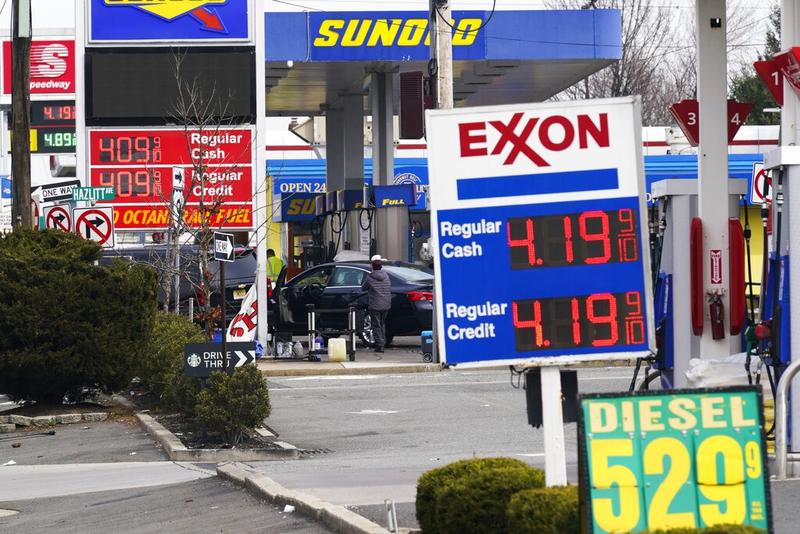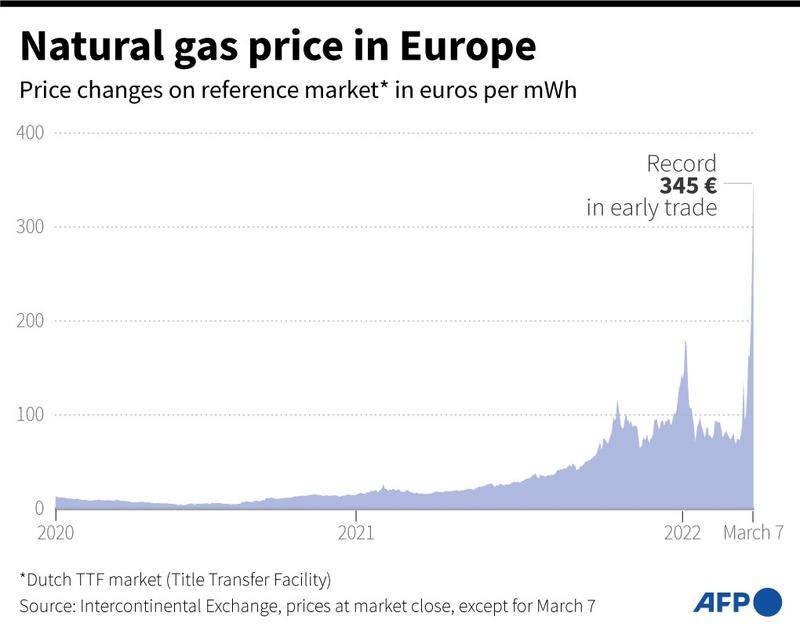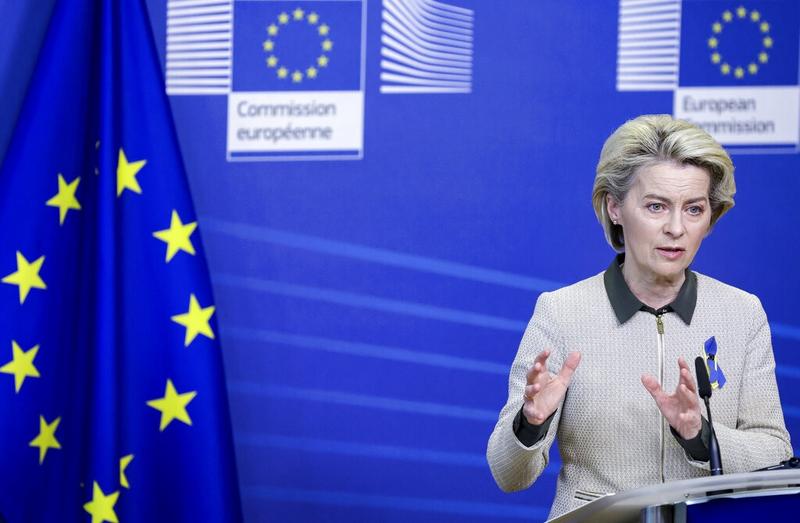 Gas prices are displayed at gas stations in Leonia, NJ on March 7, 2022. (SETH WENIG / AP)
Gas prices are displayed at gas stations in Leonia, NJ on March 7, 2022. (SETH WENIG / AP)
NEW YORK/MOSCOW/BRUSSELS - Oil prices advanced noticeably on Monday, amid growing concerns about energy supply disruptions from key exporter Russia.
The West Texas Intermediate (WTI) for April delivery added $3.72, or 3.2 percent, to settle at $119.40 a barrel on the New York Mercantile Exchange, its highest finish since September 2008. The US crude standard traded as high as $130.50 a barrel overnight.
Russia is the world's third largest oil producer, so a meaningful disruption to supply - whether in the form of export controls or declining production - could send crude oil prices even higher.
analysts at Zacks Investment Management
Brent crude for May delivery increased $5.10, or 4.3 percent, to close at $123.21 a barrel on the London ICE Futures Exchange, after briefly hitting a high of $139.13 per barrel.
"The price explosion has been sparked by the fact that the West is considering banning Russian oil imports in response to the war in Ukraine," Carsten Fritsch, energy analyst at Commerzbank Research, said Monday in a note.
US Secretary of State Antony Blinken raised this possibility at the weekend. Blinken said on Sunday that Washington was in "very active discussions" with its European partners about a ban on oil imports from Russia.
ALSO READ: 3rd round of Russia-Ukraine talks yields no 'positive results’z
"Russia is the world's third largest oil producer, so a meaningful disruption to supply - whether in the form of export controls or declining production - could send crude oil prices even higher," said analysts at Zacks Investment Management.
For the week ending Friday, the WTI spiked 26.3 percent, while Brent soared 25.5 percent, based on the front-month contracts.
 This AFP graphic dated March 7, 2021 shows the chart of the changes in natural gas prices in Europe since 2020, in euros per mWh.
This AFP graphic dated March 7, 2021 shows the chart of the changes in natural gas prices in Europe since 2020, in euros per mWh.
'Russia not responsible for rocketing prices'
Meanwhile, Russia has nothing to do with the current surge in energy prices and the volatility in the market, Russian Deputy Prime Minister Alexander Novak said Monday.
Russian Deputy Prime Minister Alexander Novak said that Russia has been fully fulfilling all its obligations, and oil and oil products are being shipped to European markets as planned
Europe consumes about 500 billion cubic meters of gas per year, and 40 percent comes from Russia, he noted in a statement, calling his country "always a reliable partner."
Russia's gas industry giant Gazprom is now fully fulfilling its contractual obligations to supply gas to Europe, Novak stressed, adding that Russia provides about 30 percent of Europe's oil consumption and is its largest supplier.
ALSO READ: World food prices reach all-time high over Ukraine, supply issues
Novak said that Russia has been fully fulfilling all its obligations, and oil and oil products are being shipped to European markets as planned.
The price of energy has spiked due to the COVID-19 pandemic and most recently because of the Russia-Ukraine conflict.
According to a flash estimate published last week by Eurostat, the statistical office of the European Union, energy prices are expected to increase by a record 31.7 percent across the eurozone in February year-on-year.
 President of the European Commission Ursula von der Leyen delivers a statement to the media prior to a meeting with Italy's Prime Minister Mario Draghi at EU headquarters in Brussels on March 7, 2022. (KENZO TRIBOUILLARD / POOL PHOTO VIA AP)
President of the European Commission Ursula von der Leyen delivers a statement to the media prior to a meeting with Italy's Prime Minister Mario Draghi at EU headquarters in Brussels on March 7, 2022. (KENZO TRIBOUILLARD / POOL PHOTO VIA AP)
Reduce energy dependence on Russia
The European Union is looking at ways to reduce its dependency on Russian gas, oil and coal, President of the European Commission Ursula von der Leyen said Monday.
To this end, the EU will accelerate its Green Deal, a roadmap for making the EU's economy sustainable, von der Leyen said when meeting with Italian Prime Minister Mario Draghi.
The EU will work on improving its energy efficiency, she said.
READ MORE: Russia declares ceasefire in Ukraine for civilians evacuation
As to the protection of consumers from the price spike amid the COVID-19 pandemic and the Russia-Ukraine conflict, the president said in the long term the EU will also have to look into its energy market composition, especially as renewables are set to represent a bigger share in the future.


